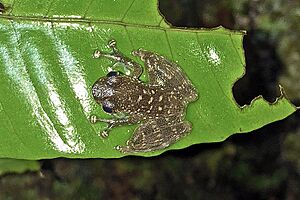Rock skipper facts for kids
Quick facts for kids Rock skipper |
|
|---|---|
 |
|
| Conservation status | |
| Scientific classification |
|
| Kingdom: | Animalia |
| Phylum: | Chordata |
| Class: | Amphibia |
| Order: | Anura |
| Family: | Ranidae |
| Genus: | Staurois |
| Species: |
S. latopalmatus
|
| Binomial name | |
| Staurois latopalmatus (Boulenger, 1887)
|
|
| Script error: The function "autoWithCaption" does not exist. | |
| Synonyms | |
|
Ixalus latopalmatus Boulenger, 1887 |
|
Script error: No such module "Check for conflicting parameters".
The rock skipper (also called the Sabah splash frog) is a type of frog. Its scientific name is Staurois latopalmatus. This frog belongs to the Ranidae family. You can only find it in certain parts of Borneo. These areas include northern and western Borneo, covering countries like Brunei, Indonesia, and Malaysia.
Contents
Meet the Rock Skipper Frog
The rock skipper is a medium-sized frog. Male rock skippers grow to be about 50 mm (2.0 in) long. Female frogs are a bit bigger, reaching about 70 mm (2.8 in). These frogs have strong legs. This makes them excellent jumpers.
What Does It Look Like?
The rock skipper has a very short, rounded snout. Its eyes are large. The space between its eyes is as wide as its upper eyelid. Its eardrum (tympanum) is quite small and not very clear.
Its fingers are short but have very large, wide pads. These pads are about three-quarters the width of its eye. The frog also has wide webbing between its toes. This webbing helps it move around its watery home.
The frog's skin is dark brown on its back. It often has lighter cross bands. The back of its thighs are blackish with white spots. Its belly and underside are whitish.
Where Rock Skippers Live
You can usually find Staurois latopalmatus in primary lowland rainforests. These frogs love clear, fast-flowing streams with lots of rocks. They often sit on vertical rock faces. You'll find them either in the rapids or very close by.
Frog Calls and Neighbors
Male rock skippers call out at night. They do this from boulders near the streams. This species is very common across Borneo. You might also find its relatives, like Staurois parvus and Staurois Guttatus, nearby.
How They Are Doing
The rock skipper is found in many places. It can even live in areas that have been slightly changed by humans. This is as long as they are close to untouched forests. The IUCN (International Union for Conservation of Nature) says this frog is of "Least Concern". This means it is not currently at high risk of disappearing. However, cutting down forests (deforestation) is still a threat to their homes.
 | William Lucy |
 | Charles Hayes |
 | Cleveland Robinson |


